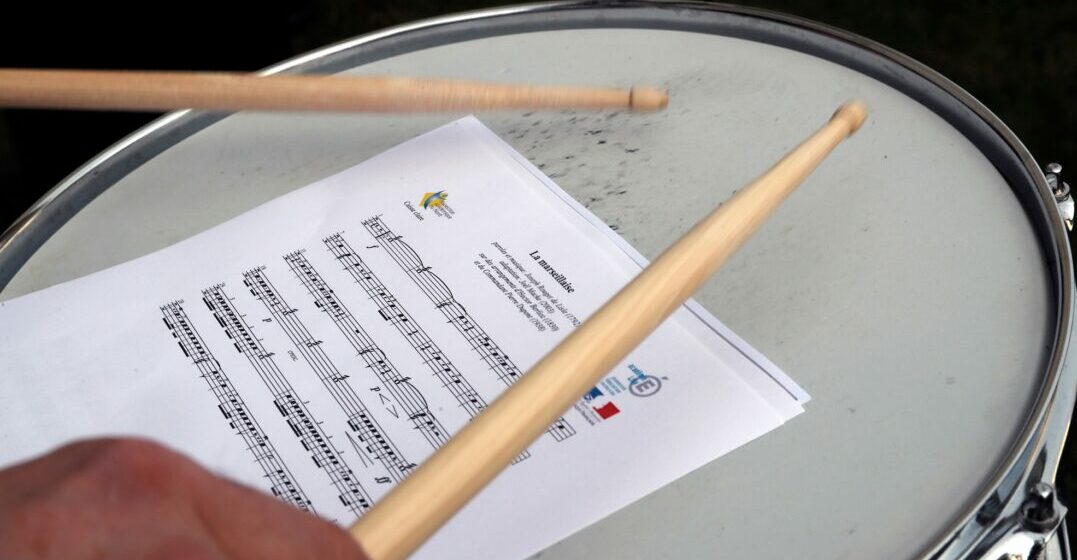Updated on December 13, 2024

The French national anthem, “La Marseillaise”

You may be surprised to learn that you probably already know the French national anthem, “La Marseillaise”. Aside from being played at most sporting events for the country, the first few bars of The Beatles’ hit “All You Need Is Love” is actually the opening sequence of the anthem! Along with the “Chant des partisans”, this song has marked many important occasions in the country, including the annual French national July 14 (Bastille Day). In this article, we’ll teach you all about the French national anthem, who wrote it and when, as well as the story behind its nickname, “La Marseillaise”.
The French national anthem was written by Claude-Joseph Rouget de Lisle, a captain in the French army in the year 1792. Before we move on to the story of the creation of “La Marseillaise,” we’ll give you a bit of historical background and context.
On April 20, 1792, France declared war on Austria and the mayor of Strasbourg at the time, P. F. Dietrich, expressed his wish for a song to help rally the French troops. Rouget de Lisle was stationed in Strasbourg at the time and he responded to the mayor by writing a piece of music on the night of April 24, 1792. He originally named the song “Chant de Guerre pour l’Armée du Rhin” (War Song for the Army of the Rhine).
So why is it called “La Marseillaise” today? Well, volunteer troops from Marseille marched from the southern city right up to Paris using this tune as a marching song. The Parisians then nicknamed the song “La Marseillaise” because they associated it with the marching of the troops.
The French national anthem has a rocky history. It was first declared France’s national anthem on July 14, 1795 (Bastille Day). It was then banned several times before officially being reinstated in 1879: it has remained the national anthem ever since.
When “La Marseillaise” was first created, the French troops took to it quickly and it became very popular. This was in part because of the lyrics of the song and in part because of the tune itself. It greatly inspired the troops to fight against an Austrian invasion, which was part of the War of the First Coalition. Napoleon, however, feared that the song might inspire people to start a revolution against him so he banned “La Marseillaise”. The song did make a brief comeback after the 1830 revolution but was banned again by Napoleon III.
In 1879 it was declared once again the French national anthem and an official version was adopted by the Ministry of War.
While the music of “La Marseillaise” has been adopted by various composers and re-created in different styles, the lyrics remain controversial. The song was written for troops going to war so perhaps understandably, the lyrics reflect this. Have a look at the chorus:
Aux armes citoyens! Formez vos bataillons!
To arms, citizens! Form your battalions!
Some people feel the French national anthem lyrics are simply too violent, as they mention ‘cut the throats of your sons’, ‘impure blood’ and the like. However, the meaning of “La Marseillaise” is simple: It’s a rally song that sends a message of resistance and defiance. This was particularly clear when it was used during the French Revolution in 1789.
Check out the lyrics of the French national anthem in French and English. In the table below, we have provided the French lyrics and English translation of the first verse and refrain. There are seven verses in total but generally, only the first verse and refrain are sung, for example at football matches.
| French lyrics | English lyrics |
| Allons enfants de la patrie, Le jour de gloire est arrivé ! Contre nous de la tyrannie, L’étendard sanglant est levé ! L’étendard sanglant est levé ! Entendez-vous dans nos campagnes Mugir ces féroces soldats ? Qui viennent jusque dans nos bras Egorger nos fils et nos compagnes ! Aux armes citoyens ! Formez vos bataillons ! Marchons, marchons, Qu’un sang impur Abreuve nos sillons! | Arise, children of the Fatherland, The day of glory has arrived! Against us tyranny’s Bloody banner is raised, Bloody banner is raised. Do you hear, in the countryside, The roar of those ferocious soldiers? They’re coming right into your arms To cut the throats of your sons, your women! To arms, citizens, Form your battalions, Let’s march, let’s march! Let an impure blood Soak our fields! |
Despite its controversial lyrics and turbulent history, “La Marseillaise” is ingrained in the history of France and remains a patriotic symbol of the country. As with any national anthem, it’s the pride and joy of the nation and its rich history makes it all the more interesting and important. Just remember to learn the lyrics of the French national anthem next time you head to a sports event or visit France on Bastille Day!